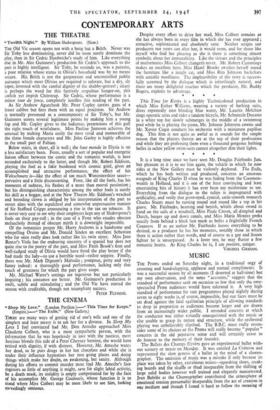CONTEMPORARY ARTS
THE THEATRE
"Twelfth Night." By William Shakespeare. (New.) THE Old Vic season opens not with a bang but a Belch. Never was Sir Toby less domineering, never did he more surely dominate the play, than in Sir Cedric Hardwicke's study of him. Like everything else in Mr. Alec Guinness's production Sir Cedric's approach to the part is highly intelligent. Sir Toby, he reminds us, was a parasite, a poor relation whose status in Olivia's household was by no means secure. His Belch is not the gargantuan and uncontrolled public nuisance which most Olivias are required to tolerate, but a dry, sly toper, invested with the careful dignity of the shabby-genteel ; sleazy is perhaps the word for this furtively crapulous hanger-on, this owlish yet impish Chinstrap. Sir Cedric, *hose performance is a minor tour de force, completely justifies this reading of the part.
As Sir Andrew Aguecheek Mr. Peter Copley carries guns of a lesser calibre but fires them with an equal precision. Sir Andrew is normally presented as a contemporary of Sir Toby's, but Mr. Guinness scores several legitimate points by making him a young fop and Mr. Copley gives to the ludicrous pretensions of this gull the right touch of wistfulness. Miss Pauline Jameson achieves the unusual by making Maria easily the most vivid and memorable of the three female characters and Mr. John Garley is highly effective in the small- part of Fabian.
Below stairs, in short, all is well ; the haut monde in Illyria is on a less satisfactory basis. Feste, usually a sort of popular and energetic liaison officer between the comic and the romantic worlds, is here seconded exclusively to the latter, and though Mr. Robert Eddison, playing the fool as a fakir burdened with cosmic grief, gives an accomplished and attractive performance, the effect of his Weltschmerz is—like the effect of too much Worcestershire sauce— pervasive and a little disconcerting. Feste, like all the fools, has his moments of sadness, his flashes of a more than mortal pessimism; but his distinguishing characteristic among the other fools is surely his skill as a beggar, and at the New Theatre Mr. Eddison's wracked and brooding clown is obliged by his interpretation of the part to extort alms with the sepulchral and somewhat unpersuasive manner of Sir Stafford Cripps announcing a rise in the tax on tobacco. It is never very easy to see why their employers kept any of Shakespeare's fools on their pay-roll ; in the case of a Feste who exudes obscure melancholy instead of obscure mirth it is downright impossible. Of the romantics proper Mr. Harry Andrews is a handsome and compelling Orsino and Mr. Donald Sinden an excellent Sebastian who for once really does look rather like his twin sister. Miss Jane Baxter's Viola has the endearing sincerity of a spaniel but does not quite rise to the poetry of the part, and Miss Faith Brook's firm and well-judged study of Olivia would have fitted the play better if she had made the lady—to use a horrible word—rather soppier. Finally, there was Mr. Mark Dignam's Malvolio ; pompous, petty and very funny indeed: a thoroughly good performance, lacking only that touch of greatness for which the part gives scope. Mr. Michael Warre's settings are ingenious but not particularly inspiring; his costumes are better. Mr. Guinness's production is swift, subtle and stimulating; and the Old -Vic have started the season with creditable, though not triumphant success.
PETER FLEMING.


































 Previous page
Previous page